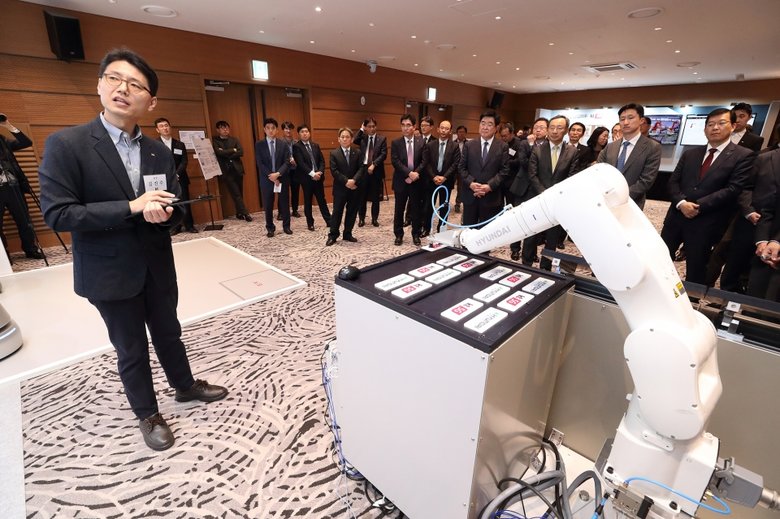Moon and Abe Meet to Resolve Conflicts
It was the first time that the leaders of South Korea and Japan broke
the ice for talks in more than a year to find a solution to a dispute that
never seemed to end.
President Moon Jae-in
and Prime Minister Shinzo Abe had a quick meeting at the ASEAN summit in
Bangkok, Thailand.
A hostile discord because
of wartime recompense had intensified lately.
In August, Japan deleted
South Korea from its list of reliable trade allies.
South Korea was quick to hit back by terminating its
knowledge-exchange contract with Japan.
The dispute hovers around the ‘comfort women’ of
Japan. Hundreds of thousands of Korean women – according to a few, around
200,000 - were forced into prostitution for Japanese soldiers at the time of
the Second World War.
South Koreans want compensation
for it, but according to Japan, the matter is resolved. Japan’s apology or
acknowledgment for war sex slaves previously and lately
in 2015 came in the form of its commitment to raise 1bn yen ($9.5m,
£7.9m) funds for helping the victims.
Nevertheless, it has desisted from increasing the
compensation, claiming that the issue was resolved in 1965 when diplomacy between
the two countries gained normalcy and $800m plus in the form of loans and financial
support was paid to South Korea.
Though critics stand for consultations with victims, something
that never happened. A few ‘comfort women’ survivors want a direct apology and remuneration
from Japan.
Monday’s statement from the South Korean president’s office
said that both countries were for talks to end the discord.
Caesars Entertainment CFO Hession Analyzing South Korea
Project Cost
Caesars Entertainment Corp. hopes to open an apparent
holistic resort in South Korea in 2021. This will be its entry move into the
East Asian gaming market. Nonetheless, the operator is being sensible about the
costs linked to the venture.
The Las Vegas-based
casino company is engaging with Chinese real estate contractor, Guangzhou
R&F Properties Co. Ltd. on the Caesars Korea project with the outlay for
the except-for-foreigners gaming spot. To be set up on Yeongjong Island, close
to South Korea’s Incheon Airport, the project cost is estimated from $700
million to $735 million. However, this is not a rigid figure and the
company is evaluating its financial liability to the Asia deal.
After Eldorado Resorts,
Inc. declared its $17.3 billion offer to buy Caesars in late June, experts
knowing the latter’s South Korea aspirations have been asking about the fate of
the project, considering the purchaser’s obvious disinterest in worldwide
growth.
Once the offer came to
the fore, the company said that it is undecided on international expansion, but
also said that expansion has to be monumental to be pursued.
Besides these, Harrah’s
and Horseshoe brands also continue to be interested in developing a gaming
facility in Brazil, although the procedure is almost not as advanced as
the Caesars Korea push.
Presently, Caesars does
not have sufficient presence in East Asia; one of the world’s most profitable
gaming territories. When Chinese controllers decided to let foreign competition
access the Macau market in 2002, Caesars stayed away and after four years, the
company refused to buy a sub-license there from rival Wynn Resorts.
Now, Macau is the nerve
center of gambling in the world. The combined gross gaming revenue (GGR) is
registered as $30.56 billion, through the first 10 months of 2019. The
region caters to Caesars’ rivals like Las Vegas Sands and Wynn.
Caesars Korea anticipates
having 720 guestrooms, conference and meeting centers and a supersize casino,
only for foreigners.
KT and Hyundai Heavy Collaborate for 5G-based Smart Factory

Primary telecom operator,
KT Corp. and foremost shipbuilding corporation, Hyundai Heavy Industries Group on
Thursday said that they will come together to set up advanced smart factory
solutions based on 5G network for better efficiency and security.
In May, the two companies inked a MoU of collaboration for a 5G-based smart factory.
They already engaged on projects to blend KT's 5G network, artificial
intelligence and big data technologies with Hyundai Heavy Industries' robotics
and shipbuilding proficiency.
After a 5G network
rollout for enterprises in December, KT has been building B2B services to
expand usage scenarios of the ultra-fast network and build new means of income.
In the words of KT Chairman Hwang Chang-Gyu, ‘A smart factory is one of the key
B2B models available on the 5G network’. ‘The companies will collaborate to
drive innovation in the local manufacturing industry.’
KT stressed that its
enterprise-based 5G network is more secure against hacking and offers professional
solutions designed for domestic manufacturers.
Also, KT’s smart factory solution can swiftly identify robots’ strange behavior
and eliminate errors.

